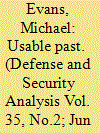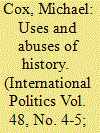| Srl | Item |
| 1 |
ID:
156137


|
|
|
|
|
| Summary/Abstract |
This paper examines issues of techniques and factor analysis in research in general and in military history research in particular, which determine the functioning conditions for the phenomenon or process under examination.
|
|
|
|
|
|
|
|
|
|
|
|
|
|
|
|
| 2 |
ID:
165360


|
|
|
|
|
| Summary/Abstract |
The most effective way for the Western profession of arms to use history is to disavow the purism and narrow specialisation of today’s academia in favour of developing a contemporary approach to the subject. The latter aims to foster a range of applied diagnostic skills that transcend the temporal dimensions of past, present, and future. A contemporary approach to history for military professionals emphasises the use of inter-disciplinary war studies to enhance policy relevance. In any defense and security organisation, history must be usable in the sense of providing cognitive and interpretative skills for probing relationships between possibility and actuality, between experience and expectation, and between singularity and repetition. Using history to examine such dialectical interconnections is particularly valuable when military establishments confront their essential task of analyzing emerging trends in the future of war.
|
|
|
|
|
|
|
|
|
|
|
|
|
|
|
|
| 3 |
ID:
106348


|
|
|
|
|
| Publication |
2011.
|
| Summary/Abstract |
In the by now extended debate about the end of the Cold War and its causes, very little attention has been paid to the role played by historical memory in helping shape the way policy-makers approached the collapse of the post-war order. As this article shows, many, if not most policy elites at the time, confronted the passing of the old world with a great degree of caution and trepidation; and one of the key reasons they did so, it is argued here, is because of their reading of the past. This reading, I go on to suggest, made many of them especially cautious and fearful when faced with great change. In the end of course these changes proved irresistible, and for liberals at least seemed to augur in more peaceful and prosperous times. However, as we shall see here, this unguarded optimism was not much in evidence as the old international system and the other superpower collapsed after 1989. Looking backwards rather than forwards, policy-makers approached the new dawn with much less enthusiasm and optimism than their public pronouncements seemed to indicate at the time or later.
|
|
|
|
|
|
|
|
|
|
|
|
|
|
|
|